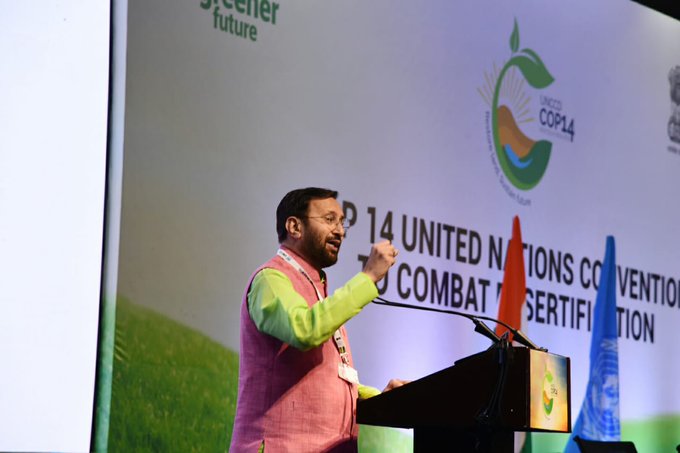

Delhi Declaration has some gaps
The full text of the Delhi Declaration, available here, emphasized that ‘there is no Planet B’ at the COP 14 Meet held in Delhi NCR from 2–13 September 2019.
Few highlights of the Delhi Declaration:
Gender Perspective: The Delhi declaration says that the need to establish a concrete action strategy linking the three Rio conventions to harness ecosystem restoration, green infrastructure, and other nature-based solutions. Several speakers emphasized that gender equality and women’s empowerment is a critical element in the success of restoration activities.
Food Security: Restoring the health and productivity of the land for food production is a top priority for many countries. The principles in the Voluntary Guidelines on the Responsible Governance of Tenure of Land, Fisheries and Forests in the context of National Food Security were referenced by several speakers as essential to our efforts to combat land degradation.
Indigenous communities: The declaration urged the global community to recognize, promote and harness indigenous communities’ invaluable knowledge and intuitive connection with nature.
Religion: The declaration mentioned that all world religions remind us in their sacred texts that land is ‘holy’. The discussions explored how to build a broader dialogue between people of all faiths and creeds to inspire collective action in protecting our global lands.
Land and water go hand in hand: the declaration quoted Ambassador Howard Bamsey, Chair of the Steering Committee of the Global Water Partnership, said: “We can’t have healthy land and healthy life without healthy water.” He stressed that the vulnerability of water systems is also affecting the health of the land.
The final draft has omitted the role of international financial institutions and fails to mention the link between UNCCD and other scientific bodies like IPBES or even IPCC. The declaration has diluted the role of bodies like GCF, GEF and other funds like Adaptation funds that were previously in the following para:
“Invite international financial mechanisms, including the GCF, GEF and Adaptation Fund, and relevant development partners to put in place a rapid and flexible process for allocating increased financial and technical support to Parties implementing projects that combat DLDD (desertification, land degradation, and drought) and deliver co-benefits”
The above-mentioned para has been replaced by:
“Invite development partners, international financial mechanisms, the private sector, and other stakeholders to boost investments and technical support for the implementation of the Convention and the achievement of land degradation neutrality, create green jobs and establish sustainable value chains for products sourced from the land.”
The mention of tenurial rights has been downplayed too, as the declaration has no clear plan or specific measures that can lead an action. You can access the draft of the declaration here.
1. The mandate for blending Compressed Biogas (CBG) with natural gas has come into effect…
Andhra Pradesh is striving towards greening its energy sector with quite some speed. In a…
With an objective to bolster India’s green energy goals, a Tripartite Agreement has been signed…
The Union MNRE Minister Pralhad Joshi launched the Green Hydrogen Certification Scheme of India (GHCI)…
India’s energy conglomerate Bharat Petroleum Corporation Limited (BPCL) has commissioned a 5MW green hydrogen plant…
In a historical development, the European Space Agency (ESA) has successfully launched its pioneering ‘Biomass’…